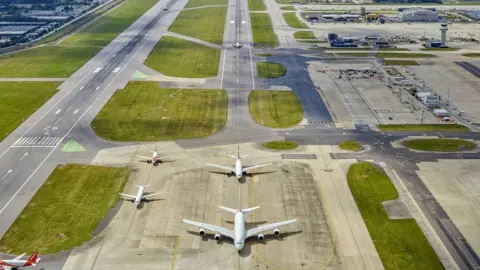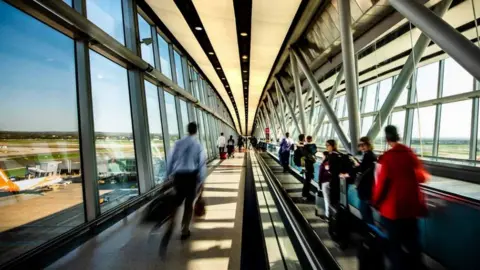Gatwick Airport presses ahead with second runway plans
 Gatwick Airport
Gatwick AirportGatwick Airport is pressing ahead with plans to use its emergency runway for routine flights.
It aims to convert its standby runway by 2029 despite passenger numbers dropping due to the global pandemic.
A public consultation on the proposals, which were first announced in October 2018, is due to open on 9 September.
Local campaigners called the plans "despicable", after concerns were previously raised over noise, congestion and air quality.
Under the plans, the emergency runway - which is currently used as a taxiway or when the main runway is closed - would be used for departures of smaller planes.
It would enable Gatwick to boost its annual passenger capacity from 62m to 75m by 2038.
About 1m passengers travelled through Gatwick in the first seven months of this year, with the South terminal at the West Sussex airport remaining closed.
That total was reached after just 10 days in 2019.
 Gatwick Airport
Gatwick AirportAirport bosses expect pre-pandemic traffic levels to return by 2025 or 2026.
Gatwick's chief executive, Stewart Wingate, said: "While we are currently experiencing low passenger and air traffic volumes due to the global pandemic, we are confident that Gatwick will not only fully recover to previous passenger levels, but has the potential to continue to grow back into one of Europe's premier airports."
He said it was "the right time" to launch a 12-week public consultation, as there will be "a requirement for airport expansion by the late 2020s".
Local campaign group Communities Against Gatwick Noise and Emissions said: "It is despicable for a company to ignore the emissions that planes in and out of Gatwick produce."
It said the plans were causing "grave danger for future generations that will have to pay the price for today's greed".
Gatwick had previously been accused of creating a "a second runway by stealth".
It lost out to Heathrow Airport in a bid to obtain government approval to build an additional runway, amid a need for more airport capacity in the south-east of England.

Follow BBC South East on Facebook, on Twitter, and on Instagram. Send your story ideas to southeasttoday@bbc.co.uk.
